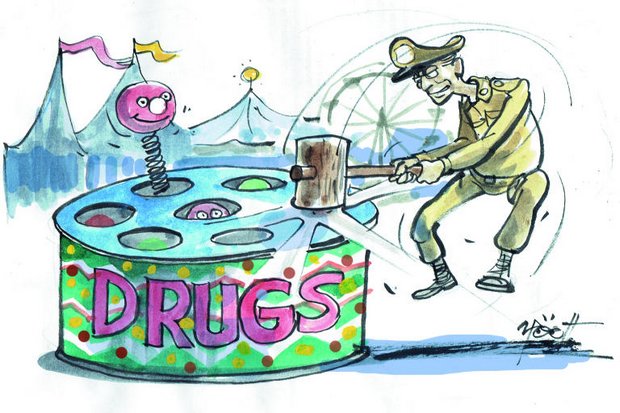
New plans for treatment of drug addicts and abusers are a welcome step on the way to badly needed drug reform. The steps announced last week by the chief of the prime ministers Office of the Narcotics Control Board (ONCB) may make it possible to begin rehabilitation instead of criminal treatment. As welcome as the new programme is, it is still only a tentative step towards what is needed. It is time for bold steps and a new outlook on the problem.
Illegal drugs are not just a sore on society. The suffering of addicts and their families is indisputable. But big-time drug smuggling is a threat to national security. Illicit drugs are a direct gateway to graft, even at very high levels. The "big fish" makers and smugglers corrupt virtually everything and everyone they touch.

Because the five-decade "war on drugs" is such an obvious failure, it is vital to find and employ new methods. One of the first attempts to dip Thailand's toe in the river of national drug reform was announced last week by the junta-appointed ONCB secretary-general, Sirinya Sitdhichai. He has put in motion what he is too grandly calling "a comprehensive drug rehabilitation programme". In fact, the new policy brings only some small, if highly important changes.
The goal of the programme is to give arrested drug users a chance to get out from under the stigma of a drug conviction. Those who register and attend a seven-session rehabilitation get a very fine reward: their arrest records are completely expunged. This provides an excellent incentive and a great chance for determined, motivated young people.
Just how this new measure will pan out can't be predicted. Disappointments are as certain as the opportunities. Mr Sirinya told this newspaper last week that more than 70,000 arrested drug abusers signed up at the initiation of the project. But 10,000 didn't even show for the first of the seven rehab sessions. There is no word yet how many of the remaining 60,000 succeeded.
Even if only a handful make it, however, this is a worthwhile effort by the ONCB and justice officials. Many drug abusers come to their senses and try to put their lives back together. The help of family and friends is vital. But a chance to get a fresh start, with a clean record, is also a chance to compete in the job market and become productive and proud.
It is a step in the right direction and at the same time it is a step away from one of the worst tragedies of the war on drugs -- the personal harm done with just one petty drug arrest and conviction. Since the 1960s, the law has failed hundreds of people by lumping drug users and abusers with drug sellers, smugglers and big-fish cartel members. Mr Sirinya must now push ahead to bring more significant reform to this pernicious problem of illicit drugs.
There are many reasons for the failure of the war on drugs. In this region, there always has been one or more countries so corrupted by the narcotics mafia. Until the 1980s, Thailand was one of those countries. The Golden Triangle area was where drug warlords sheltered, and kingpin Khun Sa lived openly on Thai territory. Once Thailand ran off the drug lords, Myanmar has been their home. In the 1990s, the tatmadaw even struck deals with every significant cartel head, including Khun Sa, allowing them sanctuary if they "invested" in the country.
Thailand has recently become a major target of a billion-pill onslaught of methamphetamines, or ya ba. The solution is drug liberalisation combined with strong diplomatic, police and military pressure. on the cartels. Thailand has the expertise and must develop the gumption to lead such a holistic campaign.
